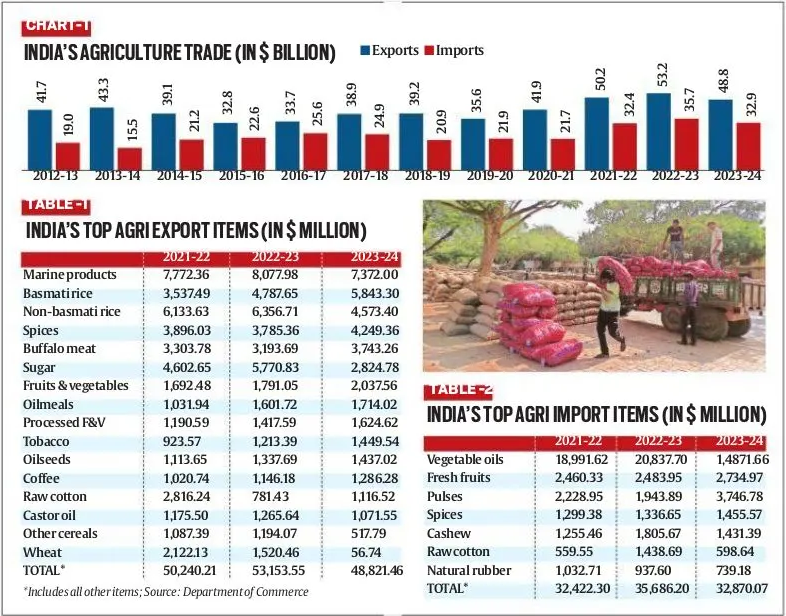Table of Contents
Context: India’s agricultural exports dropped by 8.2%, totalling $48.82 billion, down from a record $53.15 billion in 2022-23 and $50.24 billion the previous fiscal year.
More In News
- This decline follows a previous downturn where exports fell from $43.25 billion in 2013-14 to $35.60 billion in 2019-20.
- The drop in global agricultural commodity prices, as indicated by the UN Food and Agriculture Organization’s (FAO) food price index, contributed to the reduced competitiveness of India’s exports and increased vulnerability to imports during that period.
India’s Agri Trade: Factors Driving Change
- Global commodity prices: Low international prices earlier hampered exports, while the recent surge due to COVID-19 and the Russia-Ukraine conflict had boosted them.
- Government restrictions: The decline in exports was significantly impacted by government-imposed shipment curbs on key commodities like sugar, non-basmati rice, wheat, and onions.

Specific Examples
- Sugar: Exports fell to $2.82 billion in 2023-24 from higher values in the previous years due to a ban on sugar exports.
- Non-Basmati Rice: Export value dropped from $6.36 billion in 2022-23 to $4.57 billion in 2023-24, influenced by a ban and a 20% export duty.
- Wheat and Onions: Exports were heavily affected by bans and high export duties, leading to significant drops in export volumes and values.
Import Trends and Policy Effects
- Overall Decline: There was a 7.9% decrease in agricultural imports in 2023-24, primarily due to reduced edible oil imports.
- Vegetable Oils: The import bill for vegetable oils fell below $15 billion due to lower global prices following the Russia-Ukraine war’s impact on the market.
- Pulses: Imports of pulses nearly doubled to $3.75 billion, marking the highest level since 2015-16 and 2016-17.
Policy Takeaways and Recommendations
- Impact on Farmers: Export bans/restrictions prioritise consumers but hurt farmers and disrupt established markets.
- Policy Predictability: Economists favour rules-based policies (like temporary tariffs) over outright bans.
- Import Duties: The government’s zero/low import duties on pulses and edible oils conflict to promote domestic crop diversification towards oilseeds and pulses.
- Need for Balanced Policy: The next government needs a rational export-import policy that considers both producers and consumers, as well as long-term agricultural goals.


 Places in News for UPSC 2025 for Prelims...
Places in News for UPSC 2025 for Prelims...
 Growth in Gold Loans and NPAs, Reasons a...
Growth in Gold Loans and NPAs, Reasons a...
 New Phase of Operation Chakra to Combat ...
New Phase of Operation Chakra to Combat ...





















